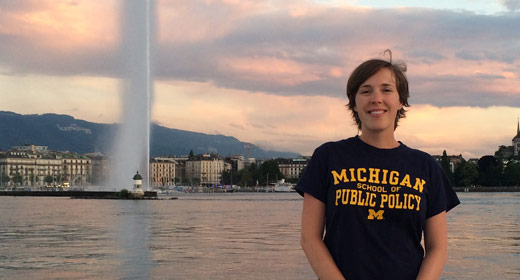
An email interview with Michele Majors, interning with the United Nations High Commission for Refugees in Geneva, Switzerland.
Review more internship field reports from Ford School students serving organizations around the world.
Q. What do you love about interning with the United Nations Refugee Agency?
A. The UN Refugee Agency assists some of the world's most vulnerable people. I can't imagine doing something more worthwhile with my summer than working for this organization in any capacity—particularly now when worldwide displacement is at a post-WWII era high.
Q. What are you working on?
A. Development aid programs like the UN Development Programme or UN Population Fund invest in eradicating systemic vulnerability. Humanitarian aid programs like the UN Refugee Agency or World Food Programme funnel staff and resources into conflict-affected areas to reduce crisis-aggravated or crisis-induced vulnerability. Each sector has its own data collection standards and methodologies, fitting for the work and timeframe it operates under. My job is to determine whether the data collected and estimates made by the UN Refugee Agency during crisis situations can also be useful to development agencies—either as it's collected now, or with adaptations.
Q. How are you going about it?
A. The bulk of my work involves comparing the data collection processes. I'm looking at the way the UN Refugee Agency collects data while registering and accommodating huge numbers of refugees who are escaping areas of conflict. I'm comparing it with the data collection processes used by development agencies under somewhat different circumstances, identifying commonalities and differences. I'm also reviewing and analyzing surveys, assessments, and indicator lists produced by experts in and outside of the UN Refugee Agency; reviewing literature on refugee data collection; and continually educating myself on the challenges refugees face, and the crises that are displacing them worldwide.
Q. What's the deliverable?
A. In July, I'll present a report on my research, receive feedback, and make improvements before submitting a final draft. The final report will ideally serve as background material for a handful of related data projects that are ramping up at the UN Refugee Agency.
Q. Any surprises so far?
A. The UN Refugee Agency is a much smaller organization than I thought it would be. In 2013, the agency assisted 42.9 million people—internally displaced by conflict, refugees, stateless persons, returnees, etc.—worldwide, so I expected UNHCR headquarters to be very large. I was not wrong, but because there are so many aspects of refugee protection and assistance—from legal protection to food delivery coordination—every team is tiny relative to the size of its responsibility. For example, on my first day the entire statistics team took me out for a welcome lunch. There were just four of us.
Q. What's it like to work there?
A. UNHCR headquarters is truly an international workplace. The work is collaborative and everyone is social while still managing large workloads. Colleagues check in on me daily. The administrative assistant handling my new hire paperwork also brings me brochures for site-seeing around Geneva. And the director of the division recently stopped by to see how my project was coming along and to ask whether I was taking advantage of living in Switzerland. It's a really friendly place.
Q. I'm sure you've learned a lot, but I'm curious if anything sticks out for you?
A. Having observed part of the agency's annual report publication process (released June 20), I'm realizing that I'm as interested in how the information is presented as I am in how it is collected and analysed. I'm now vying to get into a fall semester graphic design course when I return to the University of Michigan. I'd like to learn how to better communicate global issues and quantitative analysis visually.
Michele Majors graduated from North Park University (Chicago, IL) in 2008 with a bachelor's degree in global studies. She spent two years working as a research assistant at the Hoover Institution at Stanford University. She is interested in economic policy analysis.